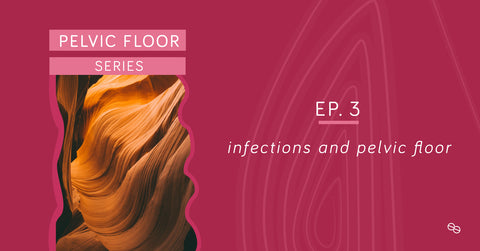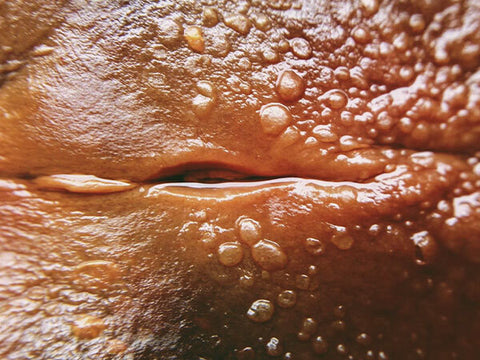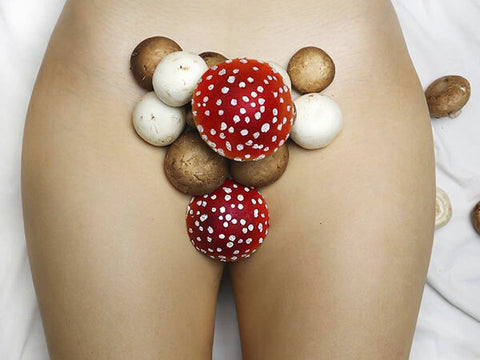UTIs, Vaginal Infections and Pelvic Floor
Yeast infections and cystitis (UTI) can be related to an altered tone of your pelvic floor. When I was discussing with Anna the index of our Series I have to admit I was very much surprised when she mentioned that.
Index:
How are infections related to pelvic floor?
Yeast infections
Cystitis
Why is a urine test so important?
How is the pelvic floor related to UTI then?
Have you ever experienced recurrent UTI after penetrative sex?
Take outs episode three
What's the next episode about?

How are infections related to pelvic floor?
How is it possible that something caused by a fungus or bacteria is linked to a muscle? Anna explained to me that especially when you have a recurrent yeast infection or cystitis - even though you have taken antibiotics - it’s worth checking your pelvic floor.
Since over 40% of cystitis become chronic diseases, I believe we have to go deeper into the topic.
We have discussed the consequences of an hypertonic pelvic floor in the previous article of this series, but in this case we have to focus on the lack of nourishment of the vaginal tissues and flora caused by pelvic floor muscles that are too contracted and not flexible.
Yeast infections
Our vaginal flora is made of many different microorganisms, mostly bacteria, including the one that gives us yeast infections. When our flora is healthy, there is a good balance between the lactobacilli and the bacteria in an acid environment (< 4.5 pH). If for any reason (from stress to antibiotics to a wrong diet) the balance within our flora is altered, bacteria will spread and we start experiencing symptoms like itches, discharges, pain (if we are talking about a yeast infection).
The best way to treat this infection is to restore the correct balance of your vaginal flora introducing the correct type of lactobacilli.

Note: avoid washing your vulva more than once a day, do not use an intimate wash with incorrect pH or with perfumes or chemicals - it can alter your flora even further. Do not use vaginal douches to treat yeast infections. Douches usually contain disinfectants that will kill all your vaginal flora - not just the “wrong” bacteria - causing an even worse situation where you’ll have to rebuild all your flora giving in the meantime a “fertile” environment for bacteria to spread.
If you have done it all and then after a while (a few weeks, a couple of months) your yeast infection is back over and over again it might be due to the fact that your flora is not nourished properly. If that happens, the vaginal balance will be more difficult to keep and you might end up in recurrent vaginal infections.
If your pelvic floor is hypertonic, it’s more difficult for your blood to run within your veins and nurture the tissues, and that’s why the status of your pelvic floor might be linked to your (recurrent) yeast infections.
We invite you, if that’s your case, to go and have your pelvic floor checked; remember that most of the time you can restore the correct tone of your muscles and get rid of any issue at any age!
Cystitis
Cystitis (usually called UTI) is another very frequent infection for people with a vulva (one third of womxn will have it by the age of 24, half by the age of 32). Since over 40% gets chronic, there must be something wrong with the way we deal with it.
Main symptoms can be:
- pain, burning or stinging when you pee
- needing to pee more often and urgently than normal
- feeling like you need to pee again soon after going to the toilet
- urine that's dark, cloudy or strong-smelling
- pain low down in your tummy
- feeling generally unwell, achy, sick and tired
- blood in your urine
The first thing we should do when we think we have a UTI is to get tested with a urine test - which doesn’t happen quite often. Instead, we tend to buy a generic pill or antibiotics.

Why is a urine test so important?
UTI can be caused by a bacteria in our bladder, however the same symptoms might be caused by an inflamed bladder. The treatment is different. If you take generic antibiotics to treat an UTI that is not caused by a bacteria, you’ll not solve the issue, you might just cover the symptoms - as well as probably disrupt your vaginal flora. As well as generic antibiotics might not be really effective and you’ll end up with an UTI a few days/weeks after the cure.
If you have done it properly, but you’ll end up anyway with a recurrent UTI (also after sex) it is worthy to check your pelvic floor.
________________________________________________________________
You may also like: What and Where is your Pelvic Floor? Why you should care.
________________________________________________________________
How is the pelvic floor related to UTI then?
Many recurrent cystitis involve our urethra (first) rather than our bladder. A portion of our pelvic floor surrounds the urethra; if you have an hypertonic pelvic floor, your urethra will develop an inflammation being continuously compressed by your pelvic floor muscles rather than just supported.
As a consequence of this inflammation we’ll experience the same symptoms as a UTI (even though the cause is not a bacteria) or, even worse, this inflammation can modify our flora and generate a UTI.
But if we do not solve the hypertension in our pelvic floor, we’ll not get rid of the UTI.
Have you ever experienced recurrent UTI after penetrative sex?
If so, go and have your pelvic floor checked. If your pelvic floor is hypertonic and your urethra is already compressed, during penetrative sex we add an extra stimulation of that (alredy) inflammed area.
During penetration we stimulate our Skene Glands (which are closed to the urethra and surrounded by our pelvic floor); those glands tend to enlarge during intercourse but if they are compressed by too tonic muscles and an already inflamed urethra, this process will generate an even stronger inflammation and pain.
Note: in case of an inflamed urethra or UTI after sex, while you work with a pelvic floor specialist to restore your pelvic tone, heat therapy can really help - we’ll see this in the next episodes.

We have mentioned our vaginal flora a lot in this episode, and we have learned it is very important to keep it healthy and in a good balance. But did you know we inherit our flora from our mum during the delivery? We are all born with a specific type of vaginal microbiome as a gift from our mums; there are different types of microbiome so if you are not born with the best one to keep your flora balanced, you should take some extra care to keep your vagina healthy. Nothing crazy, just the note we stated above plus take some extra care if you have to deal with antibiotics.
Take outs episode three
If you experience recurrent UTI, vaginal infections, UTI after sex or yeast infections the cause might be a hypertonic pelvic floor so we recommend you go and have your pelvic floor evaluated and trained to solve not only the hypertone but also any recurrent infection.
Getting generics antibiotics to treat a UTI or doing vaginal douches for yeast infections might not help at all; it can instead damage your vaginal flora.
We inherit our vaginal microbiome from our mum during delivery; there are different types of microbiome, some are stronger than others. If you don’t have inherited the best one, keep an eye on your vaginal flora and make sure you treat it well; do not wash your vulva more than once a day. Do not use intimate soaps with fragrances or the wrong pH. Try to avoid vaginal douches. Do not use intimate products (wipes included) with fragrances.
What's the next episode about?
Our next step in the discovery of our pelvic floor will be about incontinence (any sort of leaks, at any age, not only postpartum or during menopause) and prolapse.

